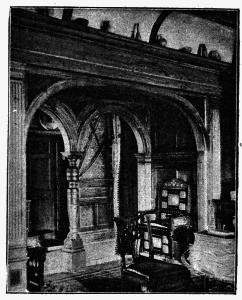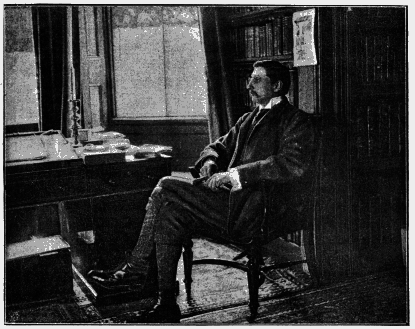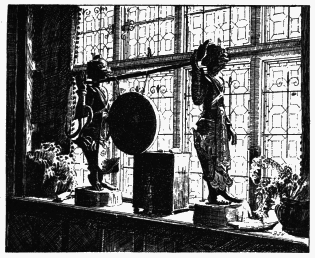
About this time the face of a girl whom I saw in a church at Norwood gave me the idea of writing a novel. The face was so perfectly beautiful, and at the same time so refined, that I felt I could fit a story to it which should be worthy of a heroine similarly endowed. When next I saw Mr. Trubner I consulted him on the subject.
'You can write—it is certain that you can write. Yes, do it, and I will get the book published for you,' he answered.
Thus encouraged I set to work. How to compose a novel I knew not, so I wrote straight on, trusting to the light of nature to guide me. My main object was to produce the picture of a woman perfect in mind and body, and to show her character ripening and growing spiritual, under the pressure of various afflictions. Of course, there is a vast gulf between a novice's aspiration and his attainment, and I do not contend that Angela as she appears in 'Dawn' fulfils this ideal; also, such a person in real life might, and probably would, be a bore—
Something too bright and good
For human nature's daily food.
Still, this was the end I aimed at. Indeed, before I had done with her, I became so deeply attached to my heroine that, in a literary sense, I have never quite got over it. I worked very hard at this novel during the next six months or so, but at length it was finished and despatched to Mr. Trubner, who, as his firm did not deal in this class of book, submitted it to five or six of the best publishers of fiction. One and all they declined it, so that by degrees it became clear to me that I might as well have saved my labour. Mr. Trubner, however, had confidence in my work, and submitted the manuscript to Mr. John Cordy Jeaffreson for report; and here I may pause to say that I think there is more kindness in the hearts of literary men than is common in the world. It is not a pleasant task, in the face of repeated failure, again and again to attempt the adventure of persuading brother publishers to undertake the maiden effort of an unknown man. Still less pleasant is it, as I can vouch from experience, to wade through a lengthy and not particularly legible manuscript, and write an elaborate opinion thereon for the benefit of a stranger. Yet Mr. Trubner and Mr. Jeaffreson did these things for me without fee or reward. Mr. Jeaffreson's report I have lost or mislaid, but I remember its purport well. It was to the effect that there was a great deal of power in the novel, but that it required to be entirely rewritten. The first part he thought so good that he advised me to expand it, and the unhappy ending he could not agree with. If I killed the heroine, it would kill the book, he said. He may have been right, but I still hold to my first conception, according to which Angela was doomed to an early and pathetic end, as the fittest crown to her career. That the story needed rewriting there is no doubt, but I believe that it would have been better as a work of art if I had dealt with it on the old lines, especially as the expansion of the beginning, in accordance with the advice of my kindly critic, took the tale back through the history of another generation—always a most dangerous experiment. Still, I did as I was told, not presuming to set up a judgment of my own in the matter. If I had worked hard at the first draft of the novel, I worked much harder at the second, especially as I could not give all my leisure to it, being engaged at the time in reading for the Bar. So hard did I work that at length my eyesight gave out, and I was obliged to complete the last hundred sheets in a darkened room. But let my eyes ache as they might, I would not give up till it was finished, within about three months from the date of its commencement. Recently, I went through this book to prepare it for a new edition, chiefly in order to cut out some of the mysticism and tall writing, for which it is too remarkable, and was pleased to find that it still interested me. But if a writer may be allowed to criticise his own work, it is two books, not one. Also, the hero is a very poor creature. Evidently I was too much occupied with my heroines to give much thought to him; moreover, women are so much easier and more interesting to write about, for whereas no two of them are alike, in modern men, or rather, in young men of the middle and upper classes, there is a paralysing sameness. As a candid friend once said to me, 'There is nothing manly about that chap, Arthur'—he is the hero—'except his bull-dog!' With Angela herself I am still in love; only she ought to have died, which, on the whole, would have been a better fate than being married to Arthur, more especially if he was anything like the illustrator's conception of him in the current edition.

In its new shape 'Dawn' was submitted to Messrs. Hurst & Blackett, and at once accepted by that firm. Why it was called 'Dawn' I am not now quite clear, but I think it was because I could find no other title acceptable to the publishers. The discovery of suitable titles is a more difficult matter than people who do not write romances would suppose, most of the good ones having been used already and copyrighted. In due course the novel was published in three fat volumes, and a pretty green cover, and I sat down to await events. At the best I did not expect to win a fortune out of it, as if every one of the five hundred copies printed were sold, I could only make fifty pounds under my agreement—not an extravagant reward for a great deal of labour. As a matter of fact, but four hundred and fifty sold, so the net proceeds of the venture amounted to ten pounds only, and forty surplus copies of the book, which I bored my friends by presenting to them. But as the copyright of the work reverted to me at the expiration of a year, I cannot grumble at this result. The reader may think that it was mercenary of me to consider my first book from this financial point of view, but to be frank, though the story interested me much in its writing, and I had a sneaking belief in its merits, it never occurred to me that I, an utterly inexperienced beginner, could hope to make any mark in competition with the many brilliant writers of fiction who were already before the public. Therefore, so far as I was concerned, any reward in the way of literary reputation seemed to be beyond my reach.

It was on the occasion of the publication of this novel that I made my first and last attempt to 'roll a log,' with somewhat amusing results. Almost the only person of influence whom I knew in the world of letters was the editor of a certain society paper. I had not seen him for ten years, but at this crisis I ventured to recall myself to his memory, and to ask him, not for a favourable notice, but that the book should be reviewed in his journal. He acceded to my prayer; it was reviewed, but after a fashion for which I did not bargain. This little incident taught me a lesson, and the moral of it is: never trouble an editor about your immortal works; he can so easily be even with you. I commend it to all literary tiros. Even if you are in a position to command 'puffs,' the public will find you out in the second edition, and revenge itself upon your next book. Here is a story that illustrates the accuracy of this statement; it came to me on good authority, and I believe it to be true. A good many years ago, the relation of an editor of a great paper published a novel. It was a bad novel, but a desperate effort was made to force it upon the public, and in many of the leading journals appeared notices so laudatory that readers fell into the trap, and the book went through several editions. Encouraged by success, the writer published a second book, but the public had found her out, and it fell flat. Being a person of resource, she brought out a third work under a nom de plume, which, as at first, was accorded an enthusiastic reception by previous arrangement, and forced into circulation. A fourth followed under the same name, but again the public had found her out, and her career as a novelist came to an end.